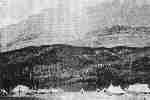
|
The Castle Mountain internment camp, Alberta, 1915 (Photo from the G.W.H. Millican Collection, courtesy of the Glenbow Museum) |
Peter Milliken has done his bit to apologize to members of Canada's Ukrainian population for indignities they suffered during the First World War.
Parliament gave unanimous support yesterday afternoon to a private member's motion introduced by the Kingston MP which called on the government to acknowledge the injustice of the internment and disenfranchisement of Ukrainians in Canada between 1914 and 1920.
In an interview from Ottawa, Mr. Milliken, the Liberal member for Kingston and the Islands, said the motion's passage was "a bit of a coup." Such petitions don't usually get to the floor of the Commons, he said, let alone be debated and finally given the House's support.
Lubomyr Luciuk, a political geography and Soviet politics professor at the Royal Military College and Queen's University - and the Ukrainian-Canadian activist who first approached Mr. Milliken on the issue - said late yesterday that he was delighted with the news.
The motion asked the government to acknowledge that the treatment of Canadians of Ukrainian origin from 1914-1920 was "unjust and unwarranted," as well as contrary to the principles of the present Charter of Rights and Freedoms.
It also said the government should instruct Parks Canada to erect historical markers at the sites of 28 wartime concentration camps - the first of which was situated at Fort Henry, overlooking Kingston - and undertake an archaeological restoration of the Castle Mountain camp at Banff, with a permanent educational exhibit to be created there.
Thirdly, the motion asked that the government start negotiations with the Civil Liberties Commission of the Ukrainian Canadian Congress in an effort to strike a deal on appropriate compensation for the Ukrainian community.
"It doesn't bind the government," Mr. Milliken said of his motion. "It just urges them to do these things, but still I think it's a significant boost for the Ukrainian community and I'm very pleased that it's happened."
The MP said seeing the motion approved was "a little coup because it's very rare to get one of these things passed."
After he won a House of Commons draw to have his motion raised, he still didn't think it would be given more than an hour's discussion before being dropped from the order paper. But everything seemed to work in his favor, he said, and when the majority Progressive Conservative party expressed no objection to the motion, it received the House's unanimous consent.
Mr. Milliken said Prof. Luciuk asked him some time ago to table a petition signed by a number of Canadians asking for this kind of redress for Ukrainians of the First World War era, because the first internment camp for people of Ukrainian origin was located in Kingston.
Then he was asked to sponsor a resolution which he duly introduced in the last Parliament but never saw debated. He reintroduced it this past May, and by chance managed to get the motion on the floor yesterday.
The Ukrainians, both Canadian born and immigrants from the late 19th and early 20th centuries, were taken into custody because part of the Ukraine was controlled by the Austro-Hungarian Empire during the First World War and part was under the jurisdiction of the Russian Empire.
As a result, all those who held past or current passports from the Ukraine were classified by Canada in the war years as "enemy aliens" in possible collaboration with Germany's allies, and later as potential Bolsheviks once the Russian Revolution broke out in 1917.
Prof. Luciuk said that when he heard Mr. Milliken's news yesterday, thoughts sprang to his mind of two people.
One, the late internee Nikita Sakaliuk, told him about being confined within the grey stone walls of Fort Henry for two years, never seeing anything but the sky above and constantly wondering what was going on in the outside world.
The other was Canadian-born Mary Haskett, nee Manko, who was interned at the age of six at the Spirit Lake, Que., camp with her mother and a younger sister. The sister later died there of pneumonia.
![]() Return to Righting An Injustice Page
Return to Righting An Injustice Page
![]() Return to Internment of Ukrainians in Canada 1914-1920 Page
Return to Internment of Ukrainians in Canada 1914-1920 Page
![]() Return to Ukrainian History Page
Return to Ukrainian History Page
![]() Return to InfoUkes Home Page
Return to InfoUkes Home Page
Document URL: http://www.infoukes.com/history/internment/booklet02/doc-064.html
Copyright © 1994 Ukrainian Canadian Civil Liberties Association
Copyright © 1994 Lubomyr Luciuk
We acknowledge the help in the preparation of this document by Amanda Anderson
Page layout, design, integration, and maintenance by G.W. Kokodyniak and V. Pawlowsky
Copyright © 1996-1997 InfoUkes Inc.
E-mail: internment@infoukes.com
|
since Mar 1 1997 |
InfoUkes Inc. Suite 185, 3044 Bloor Street West Etobicoke, Ontario, Canada M8X 2Y8 Tel: (416) 236-4865 Fax: (416) 766-5704 |
Originally Composed: Tuesday December 3rd 1996.
Date last modified: Thursday October 30th 1997.